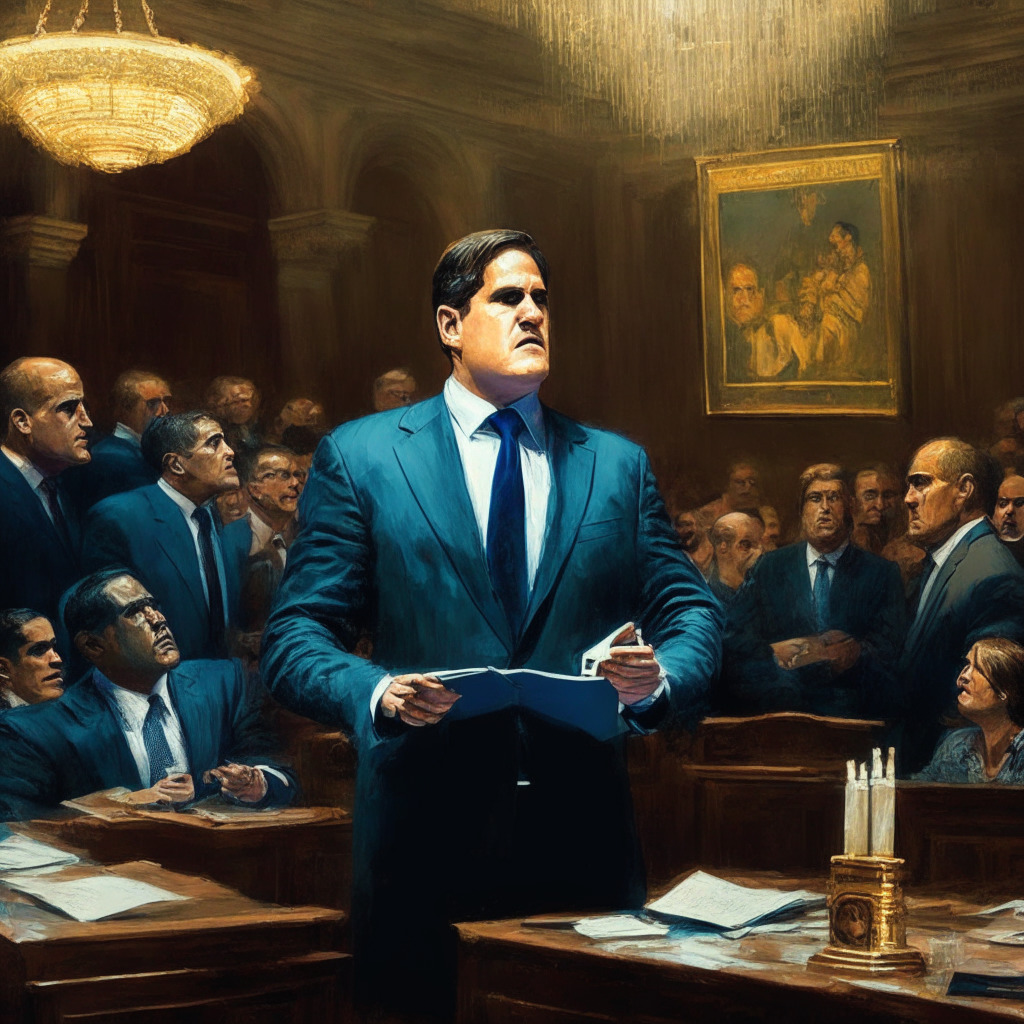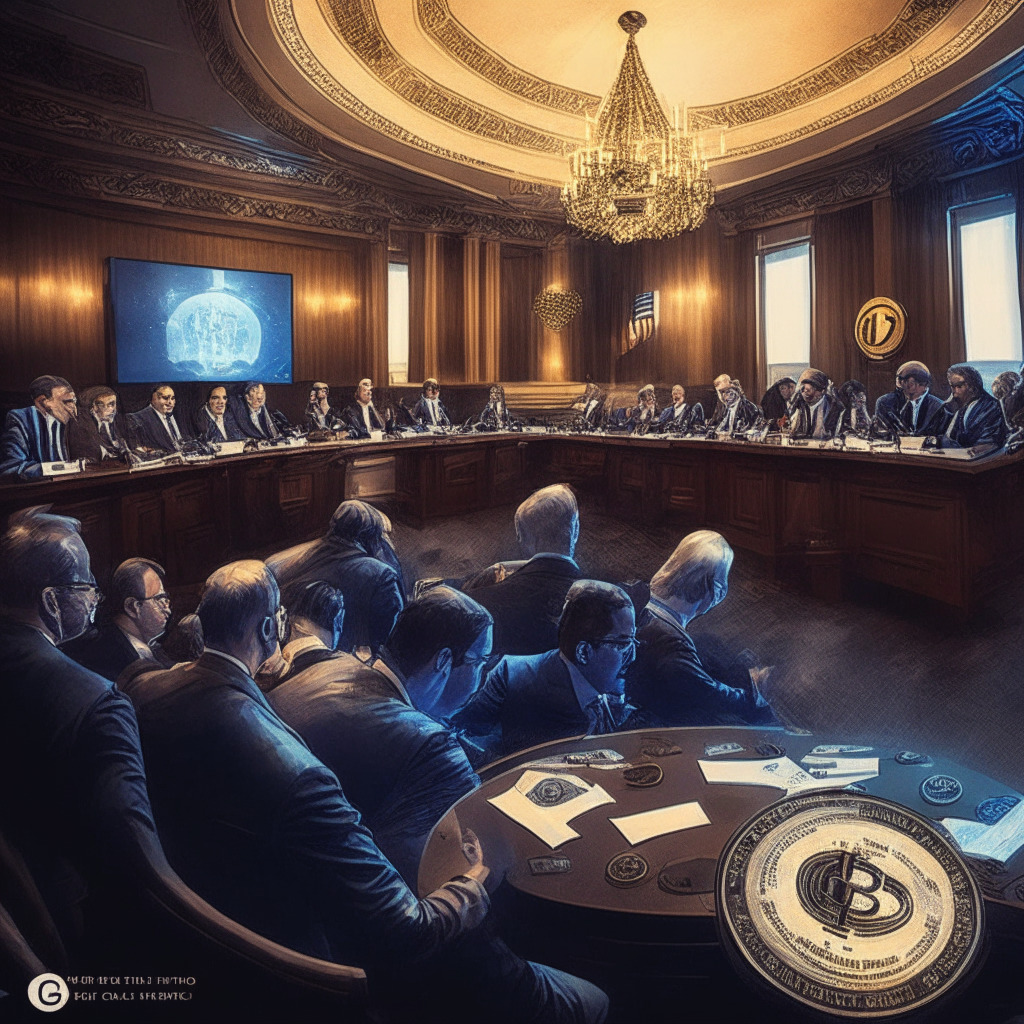“SEC Commissioners Hester Peirce and Mark T. Uyeda express concerns over broad-sweeping regulation of the diverse NFT market, citing potential complications for creators and the need for more scrupulous consideration before enforcement attempts.”
Search Results for: Hester Peirce
Shifting Political Winds: Potential Impact on US Crypto Regulatory Landscape Post 2024 Election
Recent comments from former SEC official John Reed Stark suggest potential changes to U.S. crypto regulation influenced by party politics. Stark attributes a pro-crypto regulation shift to a possible Republican win in 2024, ending current SEC chair Gensler’s tenure, and potentially paving the way for Hester Peirce, known for her softer stance on crypto.
EU’s MiCA Crypto Framework: Roots in French Regulations, Impact on Industry, and Debate on Compliance
The EU’s Markets in Crypto Assets (MiCA) regulatory framework has significant similarities to France’s existing PSAN (Digital Asset Service Provider) regulations, according to Ethereum France President Jerome de Tyche. MiCA aims to standardize crypto regulations across Europe and has received positive reactions from stakeholders and regulators, even being suggested as a model for the US by SEC Commissioner Hester Peirce.
EU’s MiCA Crypto Regulation: Inspiration for US Policy or Hindrance to Growth?
The European Union’s crypto regulation, Markets in Crypto Assets (MiCA), garners global attention, including from the SEC commissioner Hester Peirce who suggests MiCA could inspire the United States. A unified regulatory approach could foster innovation, customer protection, and potentially boost the crypto industry’s growth, provided there’s close collaboration and adaptation.
Navigating Regulatory Hurdles: CFTC Member Advocates for Cryptocurrency Pilot Program
CFTC’s Caroline Pham advocates for a pilot program to oversee cryptocurrencies, aiming to stimulate the growth of digital asset markets. Besides facing resistance from current CFTC leadership, the crypto industry’s future is uncertain due to regulatory skepticism and Congress bills’ fate.
Navigating Regulatory Ambiguity: The SEC, NFTs, and the Future of Crypto Investments
The SEC’s recent enforcement action against an NFT project has caused ripples in the NFT community, raising questions about which projects might be next. The issue of whether NFTs can be classed as unregistered securities is causing concern, with the need for regulatory clarity underlined.
Bitcoin-Backed ETF Approval: Political Climate’s Influence and the 2024 Election Saga
“Former SEC official, John Reed Stark indicates that a spot Bitcoin-backed exchange-traded fund (ETF) approval in the US is unlikely in 2023, due to multiple considerations held by the current SEC. Crypto-friendly regulations and the approval of a Bitcoin spot ETF, might be more feasible with a Republican-led Administration and SEC Commissioner after the 2024 elections.”
Mark Cuban vs SEC: The Urgent Need for Clear Crypto Regulations and Industry Growth
Mark Cuban accuses the SEC of hindering crypto startups with unclear regulations, urging for specific guidelines on crypto assets classification and product registration. The debate emphasizes the necessity of regulatory clarity to maintain the growth, success, and innovation within the blockchain and cryptocurrency sector.
SEC’s Crypto Rule Change: Balancing Innovation and Regulation in a Complex Landscape
The complex regulatory landscape surrounding the crypto industry faces pushback from House Financial Services Committee Republicans, who urge the SEC to rescind a proposed rule change on defining “exchange.” Opponents argue that the SEC’s overreach hinders innovation and technological advancements within the digital asset ecosystem, further impacting the broader U.S. economy.
Regulation Debate: SEC’s Approach Limits Crypto Exchange Accessibility & Impedes Token Functionality
The House Financial Services Committee discussed regulation of digital asset markets, focusing on crypto market structure and stablecoin regulation. Aaron Kaplan, CEO of Prometheum, stated that existing securities laws suffice for crypto regulation, echoing SEC Chair Gary Gensler’s viewpoint. However, some argue that the SEC’s current approach doesn’t provide a clear path for crypto exchanges.
SEC’s Proposal Sparks Debate: Overreach, Blockchain Future, and Freedom of Speech Concerns
The SEC extended the comments period for amending Rule 3b-16, facing criticism from the Blockchain Association and Republican committee members for its potential negative impact on the crypto industry. Opponents argue that the proposal’s broad language could capture a wide range of individuals, exceeding the agency’s authority and raising constitutional concerns.
Urgency for US Stablecoin Bill: Balancing Innovation and Regulation in Digital Currency Future
Circle’s CEO Jeremy Allaire urges US lawmakers to prioritize a stablecoin bill amid global advancements in digital currency regulations. The bill, titled “The Future of Digital Assets”, aims to foster a vibrant and safe digital assets market while balancing innovation and financial stability.
Bitcoin Consolidation, SEC Reform Battle, & Global Crypto Shifts: Analyzing Market Effects
Bitcoin enters consolidation phase amidst rising regulatory concerns in the US, with the SEC Stabilization Act proposal aiming to restructure the SEC and dismiss Chairman Gary Gensler. The future of crypto regulation remains uncertain, affecting Bitcoin’s market direction and emphasizing the importance of staying informed on developments and opportunities.
SEC Proposal vs Blockchain: Clash of Regulation and Innovation in DeFi
The U.S. SEC’s proposed rules to redefine blockchain protocols as regulated securities exchanges have sparked concerns among the crypto community due to their potential impact on the industry and lack of clarity regarding implementation and extraterritorial application. Critics argue that this approach could stifle innovation and negatively affect market participants and global competitiveness.
SEC Stabilization Act: Restructuring SEC and Crypto Regulation Controversy Unfolds
Republican congressmen Warren Davidson and Tom Emmer have filed the SEC Stabilization Act, aiming to restructure the SEC and remove Chairman Gary Gensler, citing concerns over his governance of the crypto market. The legislation seeks to provide clearer and more consistent oversight for American investors and the crypto industry, amid concerns of a detrimental impact on the market and potential migration of the industry overseas.
EU Crypto Regulation: Exploring MiCA’s Impact on Innovation and Security
EU finance ministers approved the Markets in Crypto Assets (MiCA), aiming to create a uniform approach to crypto regulation. Slated to become law this summer, MiCA will provide clarity for mainstream adoption, though tighter rules might hinder innovation. The EU’s efforts, including expanded AML rules and mandatory information sharing, aim to balance industry confidence, transparency, and potential risks.
US
The US is considering adopting Europe’s cryptocurrency regulation model, MiCA, for increased transparency, security, and consumer protection. However, concerns about privacy, personal freedom, and stifling innovation must be balanced in this evolving regulatory landscape.
US Crypto Regulation: Exploring the Timeline, Lessons from Canada, and Future Scenarios
Former SEC Counsel Coy Garrison suggests that establishing a clear regulatory framework for crypto in the US could take years. In the meantime, he points to Canada as a potential model and stresses the importance of finding the right balance between innovation and regulation to safeguard consumers and promote progress in the digital currency space.
Crypto Crime Roundup: Extradition, Insider Trading, and Kidnapping Cases Unfold
Recent legal news includes the extradition of UK national Joseph O’Connor for the 2020 Twitter hack, Coinbase’s former product manager being sentenced for insider trading, and a Vietnamese kidnapping case involving stolen crypto. In developments, Binance launches Capital Connect, Xapo Bank integrates Tether payment rails, and Unstoppable Domains joins the OMA3 Board of Directors.
Stoner Cats NFTs: SEC’s Unanticipated Role in Skyrocketing Their Value
“Stoner Cats, a web series powered by NFTs, has been fined $1 million by the U.S. SEC and is required to establish a ‘Fair Fund’ to reimburse supposedly disenfranchised investors. Despite this, Stoner Cat NFTs are trading 250% higher than before the news broke, suggesting some see the SEC action as a potential profit opportunity. This highlights the complexities of NFT regulation.”



















